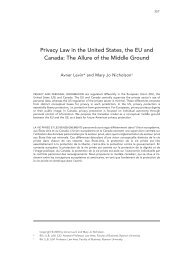Commentary on Fichte's “The Illegality of the Unauthorised ... - uoltj
Commentary on Fichte's “The Illegality of the Unauthorised ... - uoltj
Commentary on Fichte's “The Illegality of the Unauthorised ... - uoltj
You also want an ePaper? Increase the reach of your titles
YUMPU automatically turns print PDFs into web optimized ePapers that Google loves.
188 university <strong>of</strong> ottawa law & technology journal www.<strong>uoltj</strong>.ca<br />
24. Das Recht des Käufers, das<br />
Gekaufte nachzumachen, geht, soweit<br />
die physische Möglichkeit geht, es sich<br />
zuzueignen; und diese nimmt ab, je<br />
mehr das Werk v<strong>on</strong> der Form abhängt,<br />
welche wir uns nie eigen machen können.<br />
Diese Gradazi<strong>on</strong> geht, in unmerklichen<br />
Abstufungen, v<strong>on</strong> der gemeinen<br />
Studierlampe bis zu Correggio’s Nacht.<br />
Letztere hat nie um ein Privilegium<br />
nachgesucht, und ist darum doch nicht<br />
nachgemacht worden. Zwar Farben<br />
auftragen, Licht und Schatten, und ein<br />
Kind und eine junge Frau malen, kann<br />
jeder Pinsler; aber es ist uns nicht darum,<br />
es ist uns um die nicht zu beschreibende,<br />
aber zu fühlende Form des Vortrags zu<br />
thun. — Kupferstiche v<strong>on</strong> Gemälden<br />
sind keine Nachdrücke: sie verändern die<br />
Form. Sie liefern Kupferstiche, und keine<br />
Gemälde; und wem sie den letztern gleich<br />
gelten, dem bleibt es unbenommen.<br />
Auch Nachstechen sch<strong>on</strong> abgestochner<br />
Gemälde ist nicht Nachdruck: denn jeder<br />
giebt seinem Stiche seine eigene Form.<br />
Nachdruck wäre nur das, wenn jemand<br />
sich der Platte des anderen bemächtigte,<br />
und sie abdruckte.<br />
25. Und nach dieser Unterscheidung nun<br />
die Frage: Was ist ein Bücherprivilegium?<br />
Ein Privilegium überhaupt ist Ausnahme<br />
v<strong>on</strong> einem allgemein geltenden Gesetze<br />
der natürlichen, oder der bürgerlichen<br />
Gesetzgebung. Ueber Büchereigenthum<br />
ist bis jetzt kein bürgerliches Gesetz<br />
vorhanden; also muß ein Bücherprivilegium<br />
eine Ausnahme v<strong>on</strong> einem Naturgesetze<br />
sein sollen. Ein dergleichen Privilegium<br />
sagt, ein gewisses Buch solle nicht<br />
nachgedruckt werden; es setzt mithin<br />
ein Gesetz der Natur voraus, welches so<br />
lauten müßte: jeder hat ein Recht, jedes<br />
Buch nachzudrucken. — Es ist also doch<br />
wahr, daß das Nachdruckerrecht selbst v<strong>on</strong><br />
denen, in deren Hände die Menschheit<br />
alle ihre Rechte zur Aufbewahrung<br />
24. The right <strong>of</strong> <strong>the</strong> buyer to imitate his<br />
purchase extends as far as <strong>the</strong> physical<br />
possibility <strong>of</strong> appropriating it allows. And<br />
this possibility diminishes <strong>the</strong> more <strong>the</strong><br />
work depends <strong>on</strong> its form, which we can<br />
never make our own. This gradati<strong>on</strong> [237]<br />
proceeds in imperceptible steps from<br />
<strong>the</strong> comm<strong>on</strong> study lamp to Corregio’s<br />
Night. The latter has never sought any<br />
privilege, and has n<strong>on</strong>e<strong>the</strong>less never<br />
been imitated. Applying paint <strong>on</strong> a<br />
canvas, painting light and shadow, or a<br />
child and a young woman, are all things<br />
that any painter can do, but we are not<br />
c<strong>on</strong>cerned with this. We are interested<br />
in <strong>the</strong> form <strong>of</strong> <strong>the</strong> compositi<strong>on</strong>, which<br />
cannot be described, but <strong>on</strong>ly felt.<br />
Copper engravings <strong>of</strong> paintings are not<br />
re-prints—<strong>the</strong>y change <strong>the</strong> form. They<br />
produce copper engravings and not<br />
paintings. Yet whoever wants to equate<br />
<strong>the</strong>m is welcome to do so. Engravings<br />
based <strong>on</strong> previous engraved paintings<br />
are not reprints, since each pers<strong>on</strong> gives<br />
an engraving his own form. It would <strong>on</strong>ly<br />
be a reprint if some<strong>on</strong>e stole <strong>the</strong> copper<br />
plates <strong>of</strong> ano<strong>the</strong>r and used <strong>the</strong>m to<br />
produce a print.<br />
25. And after making this distincti<strong>on</strong>, we<br />
now pose <strong>the</strong> questi<strong>on</strong>: What is book<br />
privilege (Bücher privilegium)? Privilege<br />
in general is an excepti<strong>on</strong> to a generally<br />
valid rule <strong>of</strong> natural or civil law. As yet<br />
<strong>the</strong>re is no civil law regarding property<br />
in books, and as a result, book privilege<br />
has to be an excepti<strong>on</strong> to a natural law.<br />
Such a privilege states that a given book<br />
is not to be reprinted. It presupposes a<br />
natural law which would read as follows:<br />
Every<strong>on</strong>e has <strong>the</strong> right to reprint any<br />
book. Is it true that <strong>the</strong> right to reprint<br />
is recognised as a universally valid right<br />
by those in whose hands humanity has<br />
delivered <strong>the</strong>ir rights for protecti<strong>on</strong>,<br />
namely <strong>the</strong> rulers? And is it true that<br />
even <strong>the</strong> scholars recognise this right?









